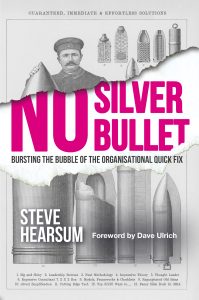By Steve Hearsum, below, author, No Silver Bullet: Bursting the bubble of the organisational quick fix
 The literature on leadership is broad and deep. For example, between January and July 2023, there were 10,900 research papers published on leadership development, out of a total of over half a million over time. That is before you count the various magazines from business publishers, universities and consultancies. The professionalisation of management has only been around for just over a hundred years, since the foundation of the first business schools and the spawning of what has become an industry in ‘thought leadership’ and experts offering their suggestions on how business leaders can become more effective and successful.
The literature on leadership is broad and deep. For example, between January and July 2023, there were 10,900 research papers published on leadership development, out of a total of over half a million over time. That is before you count the various magazines from business publishers, universities and consultancies. The professionalisation of management has only been around for just over a hundred years, since the foundation of the first business schools and the spawning of what has become an industry in ‘thought leadership’ and experts offering their suggestions on how business leaders can become more effective and successful.
The thing is, if there were a blueprint for leadership success, wouldn’t we all be going to the same expert, guru, thought leader or leadership development provider?
We all have a bit of Wile E. Coyote in us
The coyote in the classic Warner Brothers cartoons, who is forever trying to come up with a cunning plan to trap and eat the Road Runner, is symbolic of the relationship between how we both see complex challenges and attempt to overcome them. Think of Wile as a kind of ‘Every Leader’ figure: he can teach us a few simple lessons that, if we pay attention, might help minimise the risks of falling off a cliff or being crushed by an anvil. Here are three things to think about. There are more, but have these for starters (Top 3/5/10 lists are often merely a Wile-esque illusory anxiety management technique).
1. The world is full of problems!
Wile is obsessed with a problem: the Road Runner. He cannot think of anything else, and his decision making is shaped by that. In a sense, he mirrors the behaviour of many leaders who are either always scanning the environment for problems, or being told they are there to fix them. There is a sense in which “it is mutually advantageous to maintain the illusion of the world as a place of a lot of problems because it maintains a stuck-ness”, suggested Stefan Cantore when I interviewed him for my new book No Silver Bullet (he is both an academic specialising in leadership and organisations as well as a former CEO). That in turn means there is always a new problem, and a pattern of problematising. The issue with problematising the world is that it drives the need for experts and people to rescue us, and/or it ramps up the anxiety to such a degree that we will seek solutions that deny the complexity of reality. It fuels the myth of fixability.
Part of Wile’s problem is his failure to accept there may, in fact, be no perfect solution, and I suggest that this is one of the most common mistakes made by leaders. The actual endeavour of seeking a solution is misplaced because there may be no solution in the first place, or rather not a perfect, guaranteed one There are only ways of acting and operating that may be better or worse, but you won’t know until you start.
2. The denial of mess
Wile manages his anxiety by coming up with ever more elaborate and complicated ways of containing the messiness of what he is trying achieve. In this respect, he mirrors much of organisational life. When faced with change, leaders are often at risk of post-rationalising the messiness of organisational life into a story that makes sense of our experience and edits out the uncomfortable elements (e.g. mistakes, pain, loss, failure, shame, etc.) into a more comfortable narrative for future storytelling. These neatened stories are further word-smithed and polished into generalisable theories that, crucially, reinforce the myths of rationality, predictability and control. Lastly, we get the full transformation of the generalisable into idealised prescriptions and solutions that promise but can rarely, if ever, deliver certainty.
This is Wile all over, as he fails to acknowledge how circumstances are subtly changing over time. He endlessly goes back to Acme to buy different solutions to his problem … and fails on each occasion, not because the instrument is faulty, but because he fails to attend to what is happening around him and prefers action to thought, as everything he does has to be done at speed.
3. The collusion at play
In the same way that Acme collude with Wile in believing that they can sell him Silver Bullet solutions for his Road Runner problem, there is a collusion between leaders and those that sell solutions to them. The former, driven possibly by fear of failure or lack of confidence in their own abilities, are drawn to certain solutions sold by those with a vested interest in editing out uncertainty. After all, who would buy from a consultant who says: “I don’t have an easy answer or quick fix”? (Well, some do: they are my clients).
There is a whole array of players ready to tell leaders they have the answer: leadership development providers, business schools, thought leaders, consultancies, experts and more. It is understandable that this market exists. What is less clear is why, in the same way Wile must be fairly dazed, confused and sore from explosions, falls, collisions and electrocutions he is subjected to, leaders keep coming back for more.
Be less Wile
In the face of the above, here are a few suggestions, all the antithesis of Wile E. Coyote…
- Develop reflexivity – the ability to notice your own beliefs, judgments and practices and what influences these (e.g. psychological, social and systemic factors)
- Cultivate a both/and mindset – when all around are asking for either/or, yes/no, or stop/start binary responses, getting comfy with not knowing requires the ability to see and hold nuanced positions.
- Ask questions – especially when you are amid the unknown. That is the place for sensing and responding, not heroic leadership.
- Experiment – and be prepared to fail and learn. If you do not know what is going on or what to do, to expect to be right as a default it an absurdity. The problem with Wile is her never really learns from his failed experiments.
Lastly, a word on speed. Leaders I work with are often under (ever more) pressure to work faster, ‘at pace’ etc. In the same way Wile might have had more success by not trying to match pace with the Road Runner, the addiction to speed is a key blind spot in business. After all, what’s the use of going at 150mph if you are all going so fast you cannot see if you just gone over a cliff edge?
 Steve Hearsum is an experienced consultant, supervisor and developer of change practitioners, the founder of Edge + Stretch and the author of No Silver Bullet: Bursting the bubble of the organisational quick fix (out on March 29, 2024)
Steve Hearsum is an experienced consultant, supervisor and developer of change practitioners, the founder of Edge + Stretch and the author of No Silver Bullet: Bursting the bubble of the organisational quick fix (out on March 29, 2024)

